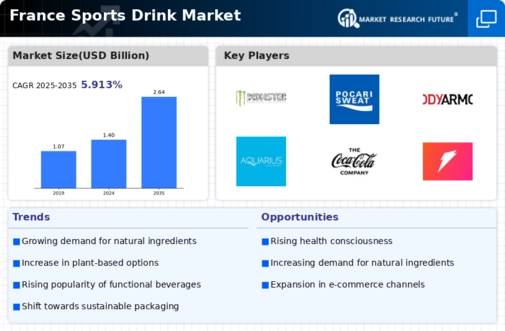The sports drink market in France exhibits a dynamic competitive landscape, characterized by a blend of established brands and emerging players. Key growth drivers include increasing health consciousness among consumers, a rising trend in fitness activities, and the growing popularity of sports among the youth. Major companies such as Gatorade (US), Powerade (US), and Isostar (FR) are strategically positioned to leverage these trends. Gatorade (US) focuses on innovation, particularly in product formulation, while Powerade (US) emphasizes regional expansion and marketing partnerships. Isostar (FR), on the other hand, is committed to localizing its offerings to cater to the specific tastes and preferences of French consumers. Collectively, these strategies shape a competitive environment that is both vibrant and challenging, as companies vie for market share through differentiation and targeted marketing efforts.
In terms of business tactics, companies are increasingly localizing manufacturing to reduce costs and enhance supply chain efficiency. This approach not only minimizes logistical challenges but also allows for quicker response times to market demands. The competitive structure of the market appears moderately fragmented, with several key players holding substantial market shares, yet leaving room for niche brands to thrive. The collective influence of these major players is significant, as they set trends and standards that smaller companies often follow.
In October 2025, Gatorade (US) announced the launch of a new line of plant-based sports drinks, aimed at health-conscious consumers seeking natural ingredients. This strategic move is likely to enhance Gatorade's appeal among a demographic increasingly concerned with sustainability and health, potentially capturing a larger market segment. The introduction of this product line reflects a broader trend towards clean-label products, which may redefine consumer expectations in the sports drink category.
In September 2025, Powerade (US) expanded its distribution network by partnering with major retail chains across France, enhancing its visibility and accessibility. This strategic action is indicative of Powerade's commitment to increasing market penetration and could lead to a significant uptick in sales. By ensuring that its products are readily available in high-traffic retail locations, Powerade positions itself to capitalize on impulse purchases, which are crucial in the beverage sector.
In August 2025, Isostar (FR) launched a targeted marketing campaign focusing on local athletes and fitness influencers, aiming to strengthen brand loyalty among French consumers. This initiative not only fosters community engagement but also aligns the brand with local sporting culture, potentially enhancing its market position. By leveraging local endorsements, Isostar may effectively differentiate itself from international competitors, appealing to national pride and consumer preferences.
As of November 2025, current competitive trends in the sports drink market are increasingly defined by digitalization, sustainability, and the integration of AI technologies. Companies are forming strategic alliances to enhance their product offerings and market reach, reflecting a shift towards collaborative innovation. The competitive landscape is evolving, with a noticeable transition from price-based competition to a focus on technological advancements and supply chain reliability. This evolution suggests that future differentiation will hinge on the ability to innovate and adapt to changing consumer preferences, rather than merely competing on price.

























Leave a Comment